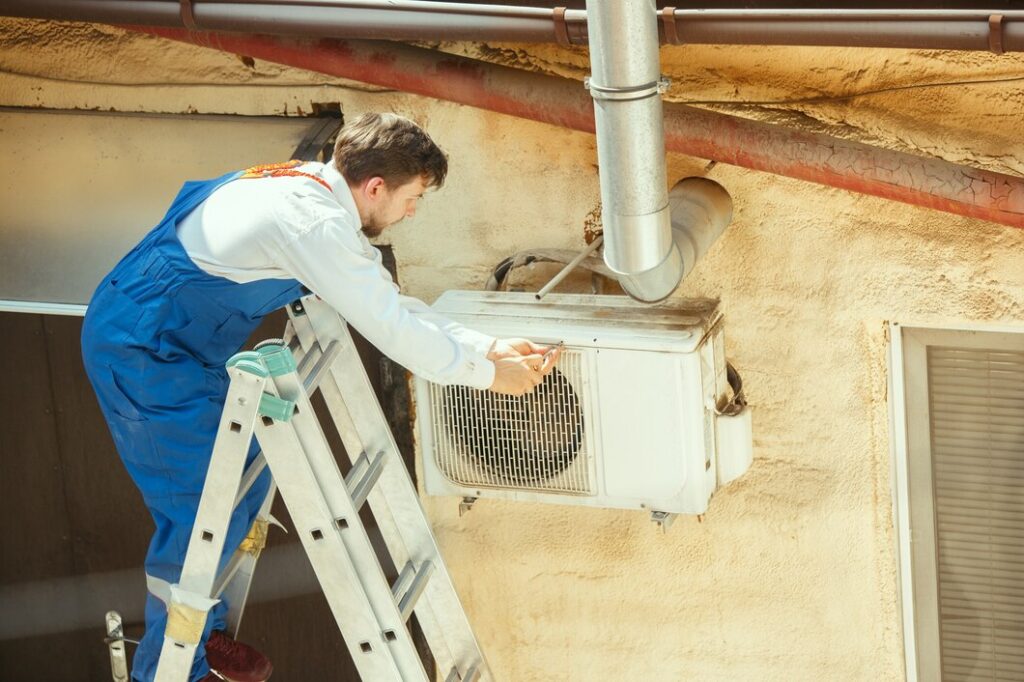When your heat pump isn’t functioning correctly, it can be both frustrating and uncomfortable. Heat pumps are essential for both heating and cooling your home, so diagnosing issues promptly is important. Understanding the root causes of heat pump problems can help you decide whether to take action on your own or call in our professionals for assistance.
Several factors can cause your heat pump to stop working efficiently. Mechanical issues, electrical problems, and environmental factors all play roles in how well your system operates. Each of these elements can impact performance in different ways. Identifying these issues early can prevent further damage and ensure your home remains comfortable throughout the year.
Common Mechanical Issues Affecting Heat Pumps
Mechanical problems are among the most common reasons your heat pump may not be working correctly. One frequent issue is a malfunctioning compressor. The compressor is the heart of the heat pump, and it circulates refrigerant to transfer heat. If the compressor fails, the entire system can stop working. Warning signs include strange noises or the unit refusing to start entirely.
Another prevalent mechanical problem is fan malfunctions. The fans in your heat pump draw air over the coils to facilitate heat exchange. If the fans are not working properly, you may notice reduced airflow and ineffective heating or cooling. This can result from worn-out fan belts, motor issues, or debris obstructing the fan blades.
Refrigerant leaks are another significant mechanical concern. Low refrigerant levels can severely impair your heat pump’s performance. Refrigerant is essential for the heat transfer process, and any leaks reduce its effectiveness. If you notice a hissing sound or reduced heating and cooling efficiency, a refrigerant leak might be the culprit. It’s crucial to have a professional handle refrigerant issues, as they require specialized skills and tools.
Clogged or dirty filters can also affect the performance of your heat pump. Dirty filters restrict airflow, making the system work harder to maintain the desired temperature. Regularly checking and replacing filters can help avoid this issue and improve your heat pump’s efficiency.
Electrical Problems That Can Disrupt Heat Pump Function
Electrical issues can be another significant cause of heat pump malfunctions. One common problem is faulty wiring. Over time, wiring can become frayed or damaged, leading to poor electrical connections. This can cause the heat pump to operate intermittently or not at all. If you suspect wiring problems, it’s essential to have a professional inspect and repair the electrical components.
Another common electrical issue is a malfunctioning thermostat. The thermostat controls the heat pump’s operation, signaling when it should turn on or off. If the thermostat is faulty, it can lead to incorrect temperature readings and improper heating or cooling cycles. Replacing the thermostat or recalibrating it can often resolve these issues.
Tripped circuit breakers can also disrupt your heat pump’s function. Heat pumps require substantial power to operate, especially during peak usage times. If the circuit breakers frequently trip, it might indicate an overloaded circuit or a more severe electrical problem. Resetting the breaker might offer a temporary fix, but recurring issues should be assessed by a professional.
Faulty capacitors are another potential electrical problem. Capacitors provide the necessary electrical energy to start the heat pump’s motors. If the capacitors are not functioning correctly, the motors may struggle to start or run inefficiently. Common signs of capacitor issues include hard starting, intermittent operation, and clicking noises.
Lastly, sensor problems can affect the efficiency of your heat pump. Sensors help regulate various components, such as the defrost cycle and refrigerant flow. If the sensors are not working correctly, the heat pump may not function as efficiently as it should. Replacing or recalibrating the sensors can resolve these performance issues.
Environmental Factors Impacting Heat Pump Performance
Environmental factors can significantly affect your heat pump’s performance. One common issue is extreme weather conditions. Extremely cold temperatures can cause heat pumps to struggle to extract enough heat from the outdoors, reducing their efficiency. Conversely, extremely hot weather can overburden the cooling system, making it harder to maintain a comfortable indoor temperature. Ensuring your heat pump is suitable for your climate can help mitigate some of these issues.
Obstructions around the outdoor unit can also impact heat pump performance. Debris such as leaves, dirt, and other forms of blockage can restrict airflow, making it difficult for the unit to operate efficiently. Ensure that the area around your outdoor unit is clear of any obstructions, and regularly clean the surrounding space to maintain proper airflow.
Another critical environmental factor is the level of humidity. High humidity levels can affect the heat pump’s ability to cool your home effectively. The moisture in the air can make the system work harder, reducing its overall efficiency and leading to potential wear and tear. Using a dehumidifier can help manage indoor humidity levels, ensuring your heat pump functions optimally.
Additionally, poor insulation in your home can lead to inefficiencies in your heat pump’s performance. If your home is not adequately insulated, it can cause the heat pump to work harder to maintain the desired temperature. Insulating your home properly can help retain the conditioned air, allowing your heat pump to operate more efficiently.
Maintenance Tips to Keep Your Heat Pump Running Smoothly
Regular maintenance is crucial for keeping your heat pump in optimal condition. Start by routinely inspecting and cleaning or replacing the air filters. Dirty filters can restrict airflow and force the system to work harder, reducing its efficiency and lifespan. We recommend checking filters monthly and replacing them as needed.
Keep the outdoor unit clean and free of debris. Regularly inspect the unit to ensure no obstructions are blocking the airflow. Trim any overgrown vegetation and remove dirt, leaves, and other potential blockages. Cleaning the coils and fins can also help maintain efficient heat exchange.
Scheduling annual maintenance checks with our professionals is also essential. During these checks, we will perform a thorough inspection of your heat pump, identifying any potential issues before they become major problems. This includes checking refrigerant levels, inspecting electrical components, and ensuring all parts are working correctly.
If you notice any unusual noises or a decline in performance, don’t ignore these warning signs. Addressing minor issues promptly can prevent more significant problems down the line. Lubricate moving parts, check for loose connections, and ensure the thermostat is functioning accurately.
Consider investing in a programmable thermostat. This allows you to set specific temperatures for different times of the day, optimizing your heat pump’s efficiency and potentially reducing energy consumption. Routine upkeep ensures your heat pump operates smoothly and extends its lifespan, providing reliable heating and cooling for years to come.
Conclusion
Understanding the various issues that can affect your heat pump’s performance is essential for maintaining a comfortable home environment. From mechanical and electrical problems to environmental factors, many elements can impact the efficiency and functionality of your heat pump. By being aware of these potential issues and taking proactive steps through regular maintenance, you can ensure your system runs smoothly and efficiently.
Adopting a proactive approach to maintaining your heat pump can save you from unexpected breakdowns and costly repairs. Regular check-ups, cleaning, and addressing minor issues promptly are key practices to keep your system in top condition. Ensuring that your heat pump operates efficiently all year round will enhance your home’s comfort and reduce energy consumption.
For professional assistance and heat pump repair services in Birmingham, AL, trust our team at Standard Heating, Cooling & Plumbing. We are here to help maintain and optimize your heat pump, ensuring it serves your home reliably. Schedule an appointment with us today and experience exceptional service.







